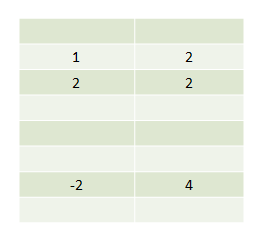找出数组里出现频率最高的元素
个人信息:就读于燕大本科软件project专业 眼下大三;
本人博客:google搜索“cqs_2012”就可以;
个人爱好:酷爱数据结构和算法,希望将来从事算法工作为人民作出自己的贡献;
博客内容:水贴王问题之续
博客时间:2014-5-12;
编程语言:Java ;
编程坏境:Windows 7 专业版 x64;
编程工具:jdk,eclipse x64;
制图工具:office 2007 powerpoint;
硬件信息:7G-3 笔记本;
真言:
痛苦的活着比死了更好。
题目:
找出数组里出现频率最高的元素。
思路:
利用哈希表统计元素的数目。
哈希表数据结构例如以下
举例:
平均时间复杂度O(N)
空间复杂度O(N)
实验:
实验1
int[] data ={1,1,2,2,2};
凝视 元素2出现了三次。
实验2
int[] data ={1,1,2,2};
凝视 元素1出现了2次(当然2也出现了两次,没有求出全部的是不足之处。我暂且仅仅求了当中一个)
代码:
piar.java
package test; public class pair { public int first; public int second; pair() { first = second = -1; } }
test.java
package test; public class test { private static final int size = 100 ; public static void main(String[] args) { int[] data ={1,1,2,2}; System.out.println(_Find_most_elem(data).first+" "+_Find_most_elem(data).second); } static pair _Find_most_elem(int[] data) { int[][] hash = new int[data.length][2]; int it_hash = 0; pair result = new pair(); for(int i=0;i<data.length;i++) { // find firstly if( hash[ data[i] % data.length ][0] == data[i] ) { hash[ data[i] % data.length ][1] ++ ; } // find secondly else { it_hash = data[i] % data.length; while(hash[ it_hash ][0] != data[i] && hash[it_hash ][1] != 0) { it_hash = (it_hash+1) % data.length ; } if( hash[ it_hash ][1] == 0 ) hash[ it_hash ][0] = data[i]; hash[ it_hash ][1] ++; } } // find most elem it_hash = 0; for(int i=1;i<data.length;i++) { if( hash[i][1] > hash[it_hash][1] ) it_hash = i ; } if(hash[it_hash][1] != 0) { result.first = hash[it_hash][0]; result.second = hash[it_hash][1]; } return result ; } }
博客之续
解决数组里仅仅同意自然数的情况。如今我要解决的问题是能够处理负数。问题来了
这时候哈希表的下标准则要又一次定义了
一開始,我们以0为标准,然后去相应哈希表的下表去填充
如今我们又一次选择參考对象。以int的最小值作为參考值,这时候我们又一次得到的数据值就会溢出,我们要用long类型去保存数据
然后依据模去相应哈希表下表填充数据
实验
代码int[] data ={1,1,2,2,-2,-2,-2,-2};
哈希表的长度为数组的长度 length = 8
java 最小值:Integer.MIN_VALUE=-2147483648
建表规则
针对data【0】。(1-(-2147583658)) % length = 1 ;
这时检測表中没有data【0】;则插入;
那么 hash[1][0] = 1; hash[1][1] ++;
否则直接 数量加一。
对于data里的数据都这样处理以此类推。
见表例如以下。空白处为默认初始值。
pair.java
package test; public class pair { public int first; public int second; pair() { first = second = -1; } }
test.javapackage test; import java.lang.Integer; public class test { private static final int size = 100 ; public static void main(String[] args) { int[] data ={1,1,2,2,-2,-2,-2,-2}; System.out.println(_Find_most_elem(data).first+" "+_Find_most_elem(data).second); } // data array including 负数 static pair _Find_most_elem(int[] data) { int[][] hash = new int[data.length][2]; long it_hash = 0; pair result = new pair(); for(int i=0;i<data.length;i++) { // find firstly it_hash = (long)data[i] - (long)(Integer.MIN_VALUE); if( hash[ (int) (it_hash % (long)(data.length)) ][0] == data[i] ) { hash[ (int) (it_hash % (long)(data.length)) % data.length ][1] ++ ; } // find secondly else { it_hash = it_hash % (long)data.length; while(hash[ (int)it_hash ][0] != data[i] && hash[(int)it_hash ][1] != 0) { it_hash = (it_hash+1) % (long)data.length ; } if( hash[ (int)it_hash ][1] == 0 ) hash[ (int)it_hash ][0] = data[i]; hash[ (int)it_hash ][1] ++; } } // find most elem it_hash = 0; for(int i=1;i<data.length;i++) { if( hash[i][1] > hash[(int)it_hash][1] ) it_hash = i ; } if(hash[(int)it_hash][1] != 0) { result.first = hash[(int)it_hash][0]; result.second = hash[(int)it_hash][1]; } return result ; } }




























 621
621

 被折叠的 条评论
为什么被折叠?
被折叠的 条评论
为什么被折叠?








